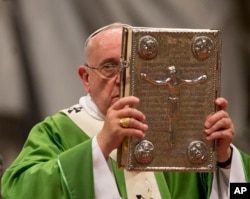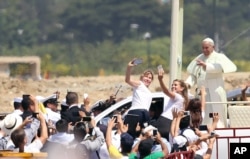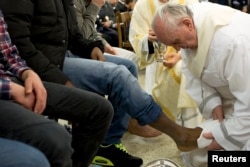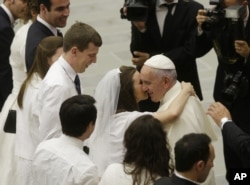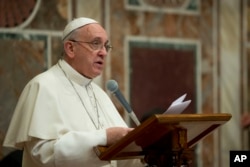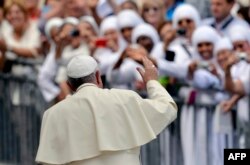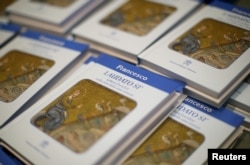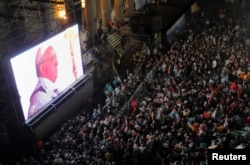In his two years as pope, the Pope Francis has made Vatican reforms and taken positions on social issues that put mercy and forgiveness as central components of his papacy, and U.S. polls have shown he remains very popular, not only with Catholics but with members of other faiths as well.
But some conservative members of the church question the pope’s motives and thoughts, and even suggest he is overreaching as the head of the Catholic Church.
A Public Religion Research Institute study released late last month showed that Pope Francis remained popular among the American public, with about 67 percent saying they had a favorable view of the pope. While a Pew Research Center survey conducted earlier this year found that nearly 90 percent of U.S. Catholics looked favorably on the pope.
Pastoral qualities
Many U.S. Catholics said they are touched by what they see as the pope’s humility and pastoral qualities.
A Pew Research poll last year, found that about 25 percent of U.S. Catholics said they feel “more excited” about their faith than they did a year ago, outnumbering the 11 percent who said they feel “less excited.”
Jeanne Baumann of Minnesota said what touched her about Pope Francis “is that we have a pope who chooses to live by the Gospels and God's words, not man's opinions or rules. … He models his life, his priesthood and his papacy on Jesus Christ. He is loving, forgiving, stern as needed, but treats people as rational, thinking adults.”
Baumann said she sees the pope’s openness, as portrayed in the media, as debunking the perception that Catholicism is a strict, monolithic faith.
“All Catholics do not think the same, do not live the same, do not interpret beliefs the same. Don't presuppose anything just because I was baptized and raised Catholic and still believe in a powerful, merciful and just God and still go to Mass regularly,” she said.
Simone Dextraze of Hollywood, Florida, who calls herself a devout Catholic, echoed that comment. “It pleases me to see how welcoming, warm and loving Pope Francis is. He has inspired the thinking of many people from an anti-Catholic view to more of an acceptance of Catholicism. I certainly see a change in attitude in some of my friends and family.”
Dextraze said she finds the pope’s many statements “welcoming” and hopes they result in bringing “more people to the Catholic faith.”
One 68-year-old woman, who described herself as a lifelong active Catholic and lives in the Northwest, said, “I have been affected much more by his example than by his pronouncements. I had lost hope in the Catholic hierarchy, but from the moment Francis appeared on the balcony after his selection, my hope was renewed.”
'Leftward shift'
Still, many conservative Catholics suggest the pope has gone too far, especially with continued criticisms of capitalism, which he has called a “subtle dictatorship” that “condemns and enslaves men and women.”
Dave Docherty of Woodstock, Georgia, said he is saddened by “the leftward shift of Vatican pronouncements.”
“Pope Francis fails to recognize the benefits of free markets, perhaps because he has never seen one operate from Argentina. This pope appears to regard socialism as a net positive, rather than the step toward totalitarian utopian oppression that it is,” Docherty added. “Pope Francis also seems to lack his predecessor's healthy awareness of the dangers of Islam.”
Docherty, who describes himself as a traditional Catholic, said he feels a much stronger connection to Pope Benedict XVI, an accomplished theologian who was known for presenting the faith in a clear and orthodox manner.
Geraldine O’Mahoney Hildreth of Hobe Sound, Florida, said, “Pope Francis is full of love and faith, but I often think he speaks without thinking, and even, sometimes, writes without thinking through the ramifications of what he writes, or the effect it might have.”
Hildreth cited the pope’s letter outlining his indulgences regarding the sacrament of confession for the Holy Year of Mercy, such as giving absolution to women who have received an abortion or simplifying the annulment process. “I applaud the intent, completely, and unreservedly,” she said, but added she felt there were many unquestioned answers in his letters.
“It would have been nice for him to dot all the “I”s and cross all the "T"s, since it is a matter of changing canon law — it can't be merciful for people to be left in confusion,” said Hildreth, who described herself as conservative on life and liturgical matters, yet “leftish” on social issues, such as ecological and labor rights.
Church teachings
Some U.S. Catholics said the fact that Pope Francis raises and discusses social issues gives them hope that the church may change in the future. However, some conservative Catholics have found fault with the pope for what they call his failure to emphasize church teachings on these same issues.
Mary Sharon Smith of La Mesa, California, said before Francis became pope, “I was seriously thinking of leaving the church because of what I felt were hurtful responses from the Vatican on many different things … I felt that the church’s stance was unloving and truly not what Jesus would be doing if walking our earth today.”
However, “Pope Francis has definitely changed my view of the church. I no longer am debating whether to leave. I am very happy how things are progressing in what I consider a loving New Testament manner,” she said.
Meghan, who asked that her last name not be used, a non-practicing Catholic from Michigan, said she broke from the church in her young adulthood, “in large part because I felt it wasn't fair to judge and exclude people, including people of other faiths, gay-lesbians or even divorcees.”
While she has felt more connected to John Paul II for most of her life, she said she finds Pope Francis “a breath of fresh air [who] seems to want to move the church forward and make it more relevant to ‘modern’ life.”
Michael Incavo, a 21-year-old student at Baylor University in Waco, Texas, believes people his age see gay marriage as the racial marriage issue of their generation.
“I believe Pope Francis, while he hasn't ‘changed’ church teaching, has brought about the right mindset and attitude that so many people feel the church doesn't have, one of love and acceptance of people and a refusal to treat people based on their actions with which the church may not explicitly agree: acknowledging [them] as people instead of sinners,” he said.
'Message of inclusion'
He added, “I hope he [the pope] continues his message of inclusion. I think that’s the real cornerstones of the Catholic faith … the message of love and forgiveness.”
During Pope Francis’ visit to Philadelphia, he will attend the World Meeting of Families, where attendees will discuss modern-day challenges facing families.
The Philadelphia conference comes just a month before October’s Synod of Bishops on the Family, held October 4-25 at the Vatican.
The bishops will discuss three hot-button issues, including how welcoming the church will be toward gay, lesbian, bisexual and transgender (LGBT); how positive the church will be toward “irregular” relationships, such as people living together but not married; and whether divorced Catholics should be able to receive Communion without first receiving an annulment.
The 68-year-old woman from the Northwest said, “I love the church for many reasons, I'm saddened to see so many young people, including [my] own children, write off the church because it has its head in the sand on too many issues that matter to them.”
While she doesn’t “necessarily want the church in sync with the ‘modern’ world, I do want it to address the issues of the modern world — environmental damage, nuclear weapons, consumerism are just a few … as well as faith,” she said.
Some looking for more
Still, some lapsed, or non-practicing, Catholics said Pope Francis and the church still had a ways to go before they would return to the pews.
Meghan, of Michigan, said, “I have mixed feelings about returning to the church or becoming a practicing Catholic again. The structure and rituals are beautiful and reassuring. However, their beliefs about relationships are just outdated.”
She added, “I would like to see the Pope take a more active role as a world leader to help address the different crises around the world. … If he called on all Catholics to help with gun violence in the U.S. or the European refugee crisis, imagine the impact.”
“His public statements about the environment, forgiveness for women who had abortions, inclusion of gays, are very forward-thinking for the church. I am interested to see how these statements take shape in practical terms,” Meghan added.
John Godzac, 65, a retired aerospace contractor in Denver, Colorado, said, “I’m a lapsed Catholic, pretty much because I felt the Church I grew up in had lost its way. I saw it as becoming fear-based, and hostile to change. It had become stuck in a ‘just say no’ posture to social change, and the leadership seemed much more conservative than the parishioners,” he added.
Godzac said Pope Francis’ “movements toward greater inclusion have caused me personally to take another look at Catholicism, and consider my role as a person who can and should make a positive difference,” he said.
However, “there is still a lot to do. Consider the role of women in the church, abuse by priests, the attitude toward divorce and remarriage. … The idea that Francis is trying to focus on people’s needs and reality is personally inspiring to me,” he added.
One Franciscan sister, who said she may have “a certain bias” toward Francis, said she sees him working to “right many of the attendant injustices [the church hierarchy] has wrought over the years,” specifically the “examination” of the main leadership group of U.S. nuns.
“Francis is trying hard to get our clergy and bishops to realize their roles of mercy, compassion and care for God's people rather than, as in so many cases, the roles of ‘judge,’ guardians of orthodoxy, and aloof managers of a closed system,” she said.
‘Laudato Si’
In June, Pope Francis released his 192-page encyclical “Laudato Si” (Praise Be), becoming the first pope ever to use scientific data in a major teaching document by calling global warming a largely man-made problem driven by overconsumption.
He denounced a "structurally perverse" world economic system and an unfettered pursuit of profit that exploits the poor and risks turning the Earth into an "immense pile of filth."
Critics accused the pope of overreaching with the encyclical, accusing him of stepping into the political arena.
In June, ahead of the release of Pope Francis’ encyclical on the environment, Republican presidential candidate Jeb Bush, a devout Catholic, said, "I don't get economic policy from my bishops or my cardinal or my pope. I think religion ought to be about making us better as people and less about things that end up getting in the political realm."
Others, such as Docherty, of Georgia, said, “Global warming is the greatest scientific fraud in history. The corruption caused by massive amounts of government money flowing only to those who produce the desired results is stunning to anyone who has been paying attention.
“The pope's falling for this shows that he is likely naive and is pandering to the European press,” he added.
John J. O’Keefe, professor of theology at Creighton University in Omaha, Nebraska, countered that the climate issue is “the most timely moral issue of the moment. … To those people who really cared about environmental issues already, this [the encyclical] was incredibly welcome.”
He admitted that he actually “kind of cried” while reading Laudato Si: Francis “was saying things I already cared about. It was just so helpful and moving.”
Other popes, including John Paul II and Benedict XVI, have also called for better care of “God’s creation.”
‘Impact on poor’
But O’Keefe said several things make Francis’ paper unique, including that he addressed the encyclical “to all people,” and also that the document isn’t focused just on climate change, but he “connects the climate issue and the ecological issues … to Catholic teaching issues and connects it to its impact on the poor.”
Some U.S. conservative commentators have accused Pope Francis of Marxist or socialist sympathies given his frequent criticisms of economic systems that "idolize" money over people and the failings of the trickle-down economic theory. Francis has said he is preaching the Gospel, not communism, when extolling his views on rampant capitalism.
Francis’ background
Dr. Martha Cruz, an assistant professor and director of economics at Catholic University of America in Washington, D.C., said Pope Francis’ background — born Jorge Mario Bergoglio in Buenos Aires, Argentina — definitely informs his opinions on the economy.
Being from Latin America and working so closely with the poor, Pope Francis “has a clear message that we must care in general” for those in need, Cruz said.
When you see poverty directly, you can no longer be indifferent. “I think being from Latin America, you witness that [poverty] so closely in your everyday life that it’s impossible not to see it,” said Cruz, who is from Quito, Ecuador.
She said people from more advanced economies who haven’t seen poverty directly, tend to think it is not reality. “Poverty is a scenario that is very cruel, where a lot of people suffer, and unless you have seen it directly, it would be difficult for you to understand and picture the need,” she added.
Cruz sees the pope’s various Apostolic Letters and encyclical as a call to action.
“I like to remind my students that economics, at the end of the day, is a social science … that we work with people and we should be striving to find solutions that people face,” she said. “I think the pope’s call, in that sense, not to forget the poor, the needy, to be concerned about migrants, people who suffer, people who struggle, in some cases, who lack information for making proper decisions. …
“All of those are in the area of economics that we are concerned,” Cruz added.
Mary Kandray Gelenser of New Cumberland, Pennsylvania, said the pope’s call to serve the poor “is core to what we believe as Christians and it has been too long ignored by Catholic leaders.”
The Public Insight Network contributed to this report. Some material for this report was provided by AP.





